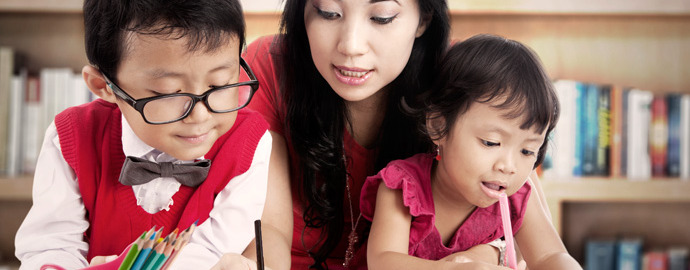+65 6338 0727
Graduate Diploma in Education and Child Psychology

October 15, 2014
Program Introduction
Child Psychology enables students to learn the mind, societal and emotional development of children. understands, prevents, diagnoses and treats developmental, cognitive, social and emotional issues of a child.
Educational Psychology enables students to gain knowledge in learning processes, what motivates individual to learn, methods in classroom management, understands the differences in intelligence, cognitive development and helping children and young people who are going through terrible time within an educational setting.
This course caters to anyone who has interests in the above two branches of psychology, but does not have a degree in psychology.
Eligibility
Academic Requirements
- Minimum 21 years old
- A Bachelor’s degree or equivalent in any discipline
- or a Diploma holder from Polytechnic / Advanced Diploma from Private Education Institutions or equivalent with minimum of 3 years working experience can be considered on a case-by-case basis
- or 30 years old and above with 8 years working experience but without academic qualification can be considered on a case-by-case basis.
Language Requirements
- Language proficiency:
- GCE O Level English C6 and above
- or minimum IELTS 5.5
- or PTEA 45
- or WPLN level 5 in Listening, Reading, Speaking and Writing
Course Fees
If you apply for our programs, you can receive grants of up to S$1,700 for Graduate Diplomas.
SkillsFuture Credits: Singaporeans aged 25 and above may use their SkillsFuture credits of up to S$500.
Additional Government Subsidies: Singaporeans and PRs may receive additional Government subsidies of up to 70%.
Post-Secondary Education Account (PSEA): Singaporeans aged 21 to 30 may use their PSEA to offset up to S$3,420, if available, of their course fees.
For miscellaneous fees, kindly refer to the Payment of Fees page.
Leave us a message or give us a call at 6338 0727 to find out more about your eligibility for the above!
Course Commencement Dates
Please click here for the list of dates.
Structure and Duration
- 8 Modules
- 12 months, Part-time (Full-time study is not available)
- 2 lessons per week
- Weekday: 7.00pm – 9.30pm / Weekend: 9.00am – 6.00pm, or 9.00am – 1.00pm
Assessment Methods
The following types of direct assessment methods are used as evaluation tools for each module:
- Assignments (60%)
- Exam (40%)
Assignments may consist of Multiple choice, True/False, Short answer questions and written assignment such as essays, Case Studies, Critical Reviews and Research Papers.
The exam is held within 1 to 4 weeks after the last lesson.
Delivery Method
Blended.
Graduation Requirements
- Earn at least a Grade Point Average (GPA) of 2.3.
- Students will be conferred Graduate Diploma in Education & Child Psychology upon completion, awarded by Arium School of Arts & Sciences.
Teaching Staff & Student-Teacher ratio
For complete list and profile of our lecturers, please click here
Average Teacher-Student ratio
- ASAS module 1:49
- WSQ module 1:25
Program Subjects
Students must complete 5 core electives and 3 free electives.
ASAS does not offer all the subjects listed below each semester or each year. Certain subjects may be offered on an alternate-year basis or as determined by demand. Check with our consultants on the availability of the subjects: https://asasedu.com/contact-us/
Student Contract
Click here to download a sample of the student contract for this course.
Modules
Core Electives (Choose 5 modules from below)
| ID | Subject Title | Credit Hours |
|---|---|---|
| 1. | Abnormal Child Psychology | 3 |
| 2. | Abnormal Psychology | 3 |
| 3. | Behaviour Modification | 3 |
| 4. | Child Play Therapy | 3 |
| 5. | Cognitive Psychology | 3 |
| 6. | Development Psychology | 3 |
| 7. | Education Psychology | 3 |
Free Electives
Course Plan
-
Programs
-
Eligibility
- Undergraduate Degree(s) awarded by recognized local/overseas Professional Institutes
-
Tags




